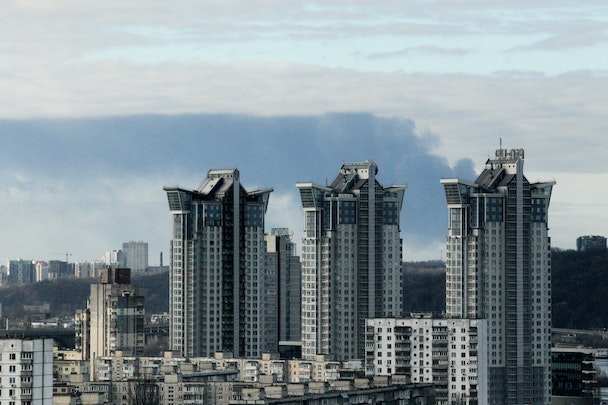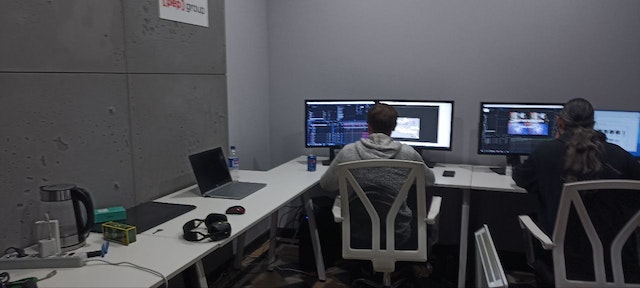Here’s how advertising’s biggest firms are helping rebuild Ukraine’s ad sector
A year after Russia’s invasion of Ukraine began, we examine how the international advertising industry has worked to support agency workers in the country – and how it’s helping it to rebuild.

Kyiv’s skyline, three days after the beginning of the invasion / Ukrinform/DepositPhoto
Since Russia’s full-scale invasion of Ukraine began one year ago, there’s been much focus on the country’s strategic importance to the global economy. Ukraine is a major exporter of grain, iron and steel. But it’s also host to a formidable advertising scene with both independent and significant network agency outposts, largely centered on Kyiv.
According to analysis from Omnicom, Ukraine’s ad market was growing rapidly in the months leading up to the war – even in the traditionally quiet months of January and February, 90% of TV inventory was sold out. At the beginning of 2022, Publicis Groupe, Dentsu (through an affiliate) and WPP together employed over 1,000 people in Ukraine, while Omnicom agencies OMD, TBWA and BBDO also maintained offices there, along with a Havas Village in Kyiv.
That meant that, when the invasion began on February 24, advertising firms put their corporate engines to work to protect and support their staff. Meanwhile, many advertising workers in Romania, Poland, Moldova, Hungary and Slovakia joined the effort to help refugees by driving to the border to pick up their Ukrainian colleagues and take them to shelter.
Advertisement
First weeks
In the first days and weeks of the invasion, most companies with operations in Ukraine focused on direct support for their staff. John Wren, chief executive officer of Omnicom, vowed that his company was “determined to step up and be part of the solution even after the war ends and rebuilding begins.”
By February 28, WPP had organized an extra cash payment to meet its employees’ immediate needs. Both Omnicom and Publicis Groupe guaranteed the salaries of their staff for the whole of 2022 (Publicis has extended this to 2023) – in addition the latter switched its payments to fortnightly, rather than monthly, to speed up cash flow to affected staff.
A Publicis Groupe spokesperson told The Drum: “We are maintaining this commitment in 2023, with the ongoing aim of providing what stability we can to our teams and their families throughout this incredibly difficult time.”
Advertisement
Agencies also put money towards refugee and aid organizations. WPP directed its specialist political campaigning agency Blue State, to drive donations to the UNHCR’s cash appeal. It says that total donations totaled more than $150m, while an internal cash donation scheme saw WPP staffers donate $675,000, a figure matched by the holding company. In Mexico, Spain and China, Stagwell employees raised funds for humanitarian charities. Dentsu pledged over $1.65m to organizations such as the Ukrainian Red Cross, and its staff in the Czech Republic launched a fundraiser for the Ukrainian infrastructure ministry, utilizing donated JCDecaux digital billboards to promote donations to help fund reconstruction.
Not all donations have been in cash, either; GroupM secured $1.5m in pro bono media support to drive donations, while clients donated a further $1.4m, said WPP’s spokesperson.
In neighboring countries, agency offices became respite stations and hubs for aid. Dentsu’s Warsaw offices, for example, were turned into a hub for Ukrainians (whether they worked for the agency or not) for childcare support, food, internet access, learning Polish and a place to rest. WPP created a Central and Eastern European ‘taskforce’ for the region, to help organize transport and accommodation for evacuations, as well as provide medical support, food, clothing and office space for its staff upon arrival from Ukraine.

Long-term support
As the year dragged on, agencies looked to provide longer-term support to staff. That meant providing mental healthcare and helping those staff that had left the country with new homes, new positions and new lives. It also meant as the number of Ukrainians leaving the country fell, providing supporting those that stayed so that they could continue working.
For example, staff at Ukrainian agency Pep Group – acquired by Stagwell network Locaria in July – initially shuffled between each other’s homes to share internet and reliable power connections. Later, the company even built an underground office in Kyiv with its own internet and generator (pictured above).
Lindsay Hong, Locaria chief operating officer, said: “The creative problem-solving and tenacity they continue to show is a daily inspiration for the wider team, and our clients, and shows through in their work.”
Dentsu’s efforts in this direction began back in March, when it launched an employment program to help find remote positions for employees wanting to continue working from Ukraine. At the time of writing, a company spokesperson said it had arranged for 63 remote positions while helping 28 people relocate permanently away from Ukraine for jobs within Dentsu. Later, it established a reskilling initiative called the Dentsu Refugee Alliance, which worked to help train and reskill 50 displaced Ukrainian employees in Salesforce and Adobe.
WPP’s task force transitioned to helping to find schools for the families of staff, language classes for those setting up in unfamiliar countries and formal immigration support. Omnicom’s team, having helped relocate 170 staff members and their families, worked to find many of them new roles in new locations, at network agencies in Dubai, Canada, France and the UK.
For staff inside and outside of Ukraine, being able to continue working has been an aid to morale. As Locaria’s executive vice-president of creative content Misha Pimenov puts it: “It provided them with a steady income to support their households, but not less importantly, it provided them with a distraction from the daily news and hardships. Being busy was psychologically beneficial to everyone, so they weren’t suffocated by the news and circumstances around them.”
Meanwhile, Publicis puts its Marcel HR platform to use to support fundraising efforts and arrange mental healthcare, as well as job opportunities for Ukrainians leaving the country. “As the devastation from the war continues to unfold, our priority remains the safety, mental health and wellbeing of our people there. We continue to provide them with the physical and emotional support they may need, wherever they are located,” said a spokesperson.
Material support didn’t stop. By winter, the damage done to Ukraine’s energy network from deliberate Russian shelling and missile strikes had become an acute problem. In December, Dentsu’s team bought and delivered power banks, solar-powered lamps, gas burners and thermal clothing for staffers coping without heat or lighting.
Advertisement
Advertising in recovery
Though agencies are still as involved in supporting staff as they were at the beginning of the invasion, they’re also now focusing on rebuilding Ukraine’s business and advertising infrastructure. WPP launched ‘Advantage Ukraine’ in September, a pro bono project for the Ukrainian government that aims to boost business investment back into the country. It’s backed by securing $9m of media via GroupM.
In the case of Stagwell, the US agency group directly invested in the country via its Pep Group acquisition. Though the deal was motivated by business goals, Pimenov says it “reinforced a feeling of security and continuity“ among the agency’s staff. Dentsu and OMD partnered with Banda, an independent creative agency based in Kyiv, to source free or low-cost media for a digital out-of-home campaign, ‘Be Brave Like Ukraine’.
Remarkably, many businesses are continuing as usual in Ukraine. Mcdonald’s reopened its outlets in September and 70% of Ukrainian businesses are fully operational despite blackouts and continued Russian strikes, according to the American Chamber of Commerce.
According to Omnicom’s analysis, advertisers have been returning to Ukraine since the third quarter of last year, beginning with the pharmaceutical category; by the fourth quarter, TV inventory was again selling out 90% of the time.
